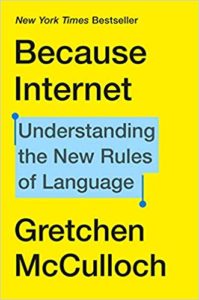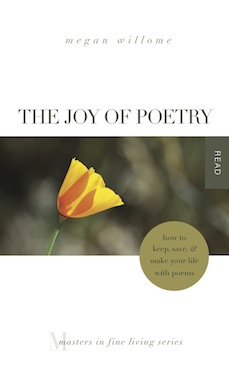
Do you know what kind of books I don’t like? Handwringing books. Books that lament the state of the nation, the world, and of course, that low-hanging fruit, the internet. Do you know what kind of books I do like? Books that dare to see things another way.
Linguist Gretchen McCulloch looks at the state of the internet and shouts, “WHAT A GREAT DAY TO BE ALIVE AND A LINGUIST!!!” (All caps and too many exclamation points used on purpose.) Times, they have a’changed, and McCulloch is like a tour guide — the kind who is so engaging that you tip her really well.
I first learned that texting had different punctuation guidelines on Science Friday, but I wasn’t sure what those new rules were. Why were my children miffed when I used a period, and my dad was miffed when I didn’t? Was I being lazy when I used emoji or expressive?
I first learned about Because Internet when McCulloch co-guest-edited the Two Bossy Dames newsletter. I’m not sure exactly what pushed me to purchase, but it might have been the list of entries from the S index, which included “sparkle punctuation,” “sparkle enthusiasm,” and “sparkle sarcasm.” In addition to authoring this book, McCulloch is the co-host of a podcast called Lingthusiasm. She’s very funny. I recommend Because Internet for the humorous footnotes alone.
In the book, McCulloch asserts that for much of human history, writing has been formal. Even letters, the treasure trove for linguists, are not as casual as they might appear. But the explosion in talking digitally has meant a whole new cache of informal communication. It’s constantly changing while simultaneously making us better communicators in real time.
It’s hardly a coincidence that our repertoire of upbeat, sociable typography expanded precisely when we needed it to build near-real-time relationships with unseen others,” McCulloch writes.
Here’s a recent example of sociable typography in my own life. While I was away at a retreat, I had an odd text from a friend. It felt excessively happy. Then once I got home, I had another text from her that felt excessively urgent. I was sure something was wrong. Once we finally connected by phone, she had bad news to share. How did I infer this from an exclamation point, a question mark, a crying/laughing emoji, and some texts without any punctuation? Simple: I know her. We’ve texted almost every day — informally — for years. Her typography tipped me off.
But McCulloch reminds us it’s not just me and my friend or Those Teens Today who have changed the nature of language through typography. It’s also Jane Austen, with her commas; and Emily Dickinson, with her dashes; and e e cummings, with his lowercase letters; and James Joyce, with his sparse punctuation; along with a couple of examples McCulloch cites from the 1890s, “that dangerously modern decade.”
The reason behind all this change? McCulloch posits that it’s love, like between me and my friend. Sure, our texts could have scrupulously followed proper English grammar, but by not doing so, we were able to better show each other that we care.
McCulloch writes: “Perfectly following a list of punctuation rules may grant me some kinds of power, but it won’t grant me love. Love doesn’t come from a list of rules — it emerges from the spaces between us, when we pay attention to each other and care about the effect that we have on each other.”
In other words, three heart emojis are better than one.
August Pages
Finished
Poetry
The Blizzard Voices, Ted Kooser
Pride, Ibi Zoboi (this YA retelling of Pride & Prejudice is filled with great poetry)
The Prophet, Kahlil Gibran
Adult
Because Internet: Understanding the New Rules of Language, Gretchen McCulloch
The Art of the Essay, Charity Singleton Craig (Book club coming in October!)
Early Readers and Picture Books
As I Was Crossing Boston Common, Norma Farber, illus. Arnold Lobel
The Golden Bird, The Brothers Grimm, illus. Lila Fromm
Handel: Who Knew What He Liked, M.T. Anderson, illus. Kevin Hawkes (remarkably funny)
Middle Grade and YA
Dear Evan Hansen: The Novel, Val Emmich with Steven Levenson, Benj Pasek & Justin Paul (Children’s Book Club selection for September 13!)
The Hate U Give, Angie Thomas (should be required reading for every American)
Pride, Ibi Zoboi (Austen’s classic reimagined through the theme of gentrification in Brooklyn)
To All The Boys I’ve Loved Before, Jennie Han (first in a trilogy)
Made Progress
Credo: The Rose Wilder Lane Story, Peter Bagge
Your turn
1. Because Internet was just released in late July. I don’t often buy books hot off the press — do you?
2. Look over your texts from this last week, especially with people you talk with regularly. Is there anything you notice that goes beyond the words? Did you use anything sparkly to communicate?
3. Did you make some time for deep reading this month? What stories stirred your soul?
4. Share your August pages. Sliced, started, and abandoned are all fair game.
Photo by Ian D. Keating, Creative Commons, via Flickr. Post by Megan Willome.
Browse more Reader, Come Home
“Megan Willome’s The Joy of Poetry is not a long book, but it took me longer to read than I expected, because I kept stopping to savor poems and passages, to make note of books mentioned, and to compare Willome’s journey into poetry to my own. The book is many things. An unpretentious, funny, and poignant memoir. A defense of poetry, a response to literature that has touched her life, and a manual on how to write poetry. It’s also the story of a daughter who loses her mother to cancer. The author links these things into a narrative much like that of a novel. I loved this book. As soon as I finished, I began reading it again.”
—David Lee Garrison, author of Playing Bach in the D. C. Metro
- Perspective: The Two, The Only: Calvin and Hobbes - December 16, 2022
- Children’s Book Club: A Very Haunted Christmas - December 9, 2022
- By Heart: ‘The night is darkening round me’ by Emily Brontë - December 2, 2022

Glynn says
I buy a few books hot off the press – a recent example is “A Better Man’ by Louise Penny. She’s a favorite author who tells a marvelous story, and this one did not disappoint.
There was another one (fiction) I bought, hot off the press, by another favorite author. I was looking forward to it; it had been promoted for five months and I really enjoyed her other books. Chapters 1 and 2 seemed odd, like the author wasn’t quite sure of her story. The explanation came in chapter 3 – a full-fledged embrace of political correctness that was distorting the story she was trying to tell. I’m slogging on with it, to see where it goes, but the book changed from telling a story to making a point. (And none of this was even hinted at in the advance promotions or the description on Amazon.)
August reading:
Mystery
Murder at the Old Abbey by Pippa McCathie
Hunted by Alison Golden
Nowhere to Hide by Stephen Puleston
Creatures of Dust by Scott Hunter
Murder Mezzo Forte by Donn Taylor
Non-fiction
The Pioneers by David McCullough
Poetry
The Heart’s Necessities: Life in Poetry by Jane Tyson Clement and Becca Stevens
Rain and Ember by Ali Nuri
The Inheritance by Justin Hamm
Flames and Shadows by Sara Teasdale
Fiction
Carnations in January by Clare Revell
The One I Trust by L.N. Cronk
Church Reformed by Tim Bayly
Victoria by Daisy Goodwin
At First Sight by Joy Ohagwu
Falling for You by Leeanna Morgan
Megan Willome says
Glynn, I know how you love a Louise Penney mystery! I’ve really enjoyed the three I’ve read, need to get back to them.
And I’m going to buy that Sara Teasdale.
Glynn says
You can get the public domain version of Flame and Shadow for free on Amazon.
Megan Willome says
Excellent!
Prasanta says
I normally do not purchase books hot off the press, but did this recently.
My text messages could definitely use more sparkle!
Several books this month were deeply moving to me: Bitten, Educated, and Where the Crawdads Sing. I call that a win!
Here’s my list for August:
Non-fiction:
Bitten (released in May) by Kris Newby
Educated: A Memoir by Tara Westover
Invited by Leslie Verner
Fiction:
Where the Crawdads Sing by Delia Owens
Homegoing by Yaa Gayasi
Halfway-finished:
Weapons of Math Destruction by Cathy O’Neil
Starting to re-read:
The Writing Life by Annie Dillard
I have to say that August was a superb reading month.
Megan Willome says
Sounds like it! So glad you shared your list, Prasanta.
What did you think of “Where the Crawdads Sing”? It came up in poetry group last week, to much debate, but I haven’t read it.
Prasanta says
I thought it was gorgeous fiction. The nature writing was stunning. I haven’t read any reviews out there–only that the book came highly recommended to me to read. I was not disappointed. It was one of those books that I wished could have gone on longer, one of those books that ended too soon. I don’t normally want to pick up and re-read a book once I’ve finished it, but that was exactly what I wanted to do, and that does not happen often.
It’s interesting to me to hear this book’s name came up to much debate. I’m glad I hadn’t read any reviews or was aware of any potential debate–I am blissfully unaware. 🙂 I simply enjoyed the book.